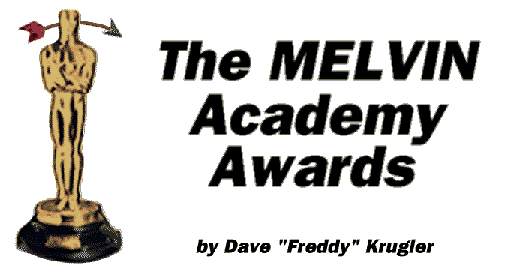

Longstanding vanguards of integrity, dignity, and easily marketable prose, Melvin Operatives swore on their fathers' cajones that this year would be different. Thus, they have devised their own categories for rating films, brazenly defying Hollywood standards and instituting their own benchmarks. We tip our hats and lilt our buttocks towards all those below, bestowed with our prestigious Melvin Academy Awards.
Since arguing over who is the best actor or actress is as pointlessly subjective as arguing over what the best rock song ever made is, we've adopted the much more objective criteria in judging our award winners. First, we've replaced "Best Picture" with "Picture with the Most Frills" as the most presitigious award. Let's face it, one ruffle in a maid's smock is worth more than ten thousand panoramic shots of untamed mutes prancing through the wilderness.
This year, we are proud to announce that Four Weddings and a Funeral wins this award handily. There were more trimmings in just one of this film's four weddings than in all of Pulp Fiction. Sure, Tarrantino can cut and splice with the best of `em, but the question all his fawning admirers have failed to put to their messiah is: Where were all the lace bodices?
In Four Weddings on the other hand, the character Garth consistently boasted authentic 19th century garb. While he violently lunged to the ground, caught in the throes of sudden heart failure, he showcased a red vest that was particularly frilly. Numerous camera pans of the film's reception scene lingered on the vest's dainty sleeves and polished brass buttons. Kudos to the director for ordering that ceiling camera shot of Garth sprawled on the castle floor. Such a vantage allowed watchers full appreciation of the intricate gold lam painstakingly sewn into the shirt.
Another sorely needed category is "Most Authentic Redneck Sodomites." In pursuit of this year's award is Pulp Fiction. Foolishly, countless movie-goers assumed Zed and his sidekick were displaced Southerners who would beat the tar out of Marsalis just for tampering with a white man's world. Newcomer Quentin Tarantino did a deft handspring over this stereotype, brilliantly casting the two dim-witted Confederates as virile homosexuals with piccadilloes for kidnapping and bondage.
Category 3: Film or Person Everyone Expects to Win Something but Strangely Doesn't
Finally, the infamous obligatory snub must be eradicated from the Academy Awards process. When Thelma and Louise won no awards, women across the country denounced the male-dominated Hollywood establishment for blatantly ignoring this archetypical film about systemic male sexism and heroic female resistance. This year the nation clucks disapprovingly over Hoop Dreams failure to garner any nominations, not even for Best Documentary.
To avoid future snubs, we propose the multiple award "Film or Person Everyone Expects to Win Something But Strangely Doesn't." Considering the expenses and efforts involved in attending, no one should leave the Academy Awards ceremony empty-handed. Hollywood is not some sort of carnival, where only the best floating duck sharp shooters or most adept toy crane operators snare choice prizes. All losers should swell with pride and happiness as they accept this consolation prize, a plaster cast bust of Pat Morita, in honor of his failure to win best actor for Karate Kid II. As an added bonus, Hollywood insiders and movie buffs alike can eagerly await Oliver Stone's future film of the never-before-told conspiracies behind the annual snubbings.
1994 was the year for hapless, exuberent half-wits; three talented actors vie for this prestigious award. As the do-good Forrest Gump, Tom Hanks spun heart-felt Southern homilies with such earnestness that his own mother probably believed life is like a box of chocolates: expensive, gooey, and bad for your teeth. An unwelcome bus stop chatter box never looked so hugable. In the toilet scene in Dumb and Dumber, Jeff Daniels' constipated grimaces and gut-clench flailings poignantly showed us so-called normal people that the stupid have bowels too, and need to use the washroom just as often as we do. An actor that commands audience sympathy while squatting, overalls dropped around his ankles, unarguably deserves serious consideration as a cute idjit. But Jim Carey evenly matches his co-star's spastic colon. Masterfully interpreting dumbness through exaggerated facial contortions, Carey convinced millions of viewers that the mentally challenged honestly express their dim thoughts in dopey grins and puzzled squints.
The obvious front-runner is "Quiz Show." The 1950s marked the apex of American innocence, even though numerous bloody wars, civil disturbances, and constant mistreatment of Native Americans preceded that heady decade. Stubbornly virginal for centuries, America's pristine hertitage finally surrendered to the ultimate debaucher, television. Director Robert Redford wisely avoided overwrought symbolism in portraying America's deflowering. For instance, close-ups of John Turturro's prickly, trickling sweat as he struggled to answer impossible quiz questions from within the isolation booth vividly reminded viewers that more than $64,000 was at stake--true blue American honesty hung in the balance. As we all sadly know, America was never the same after news of the conniving T.V. cheats broke. Bewilderment quickly bred cynicism which itself spawned anti-Vietnam protests, Watergate, and Ross Perot's 1992 presidential campaign.





